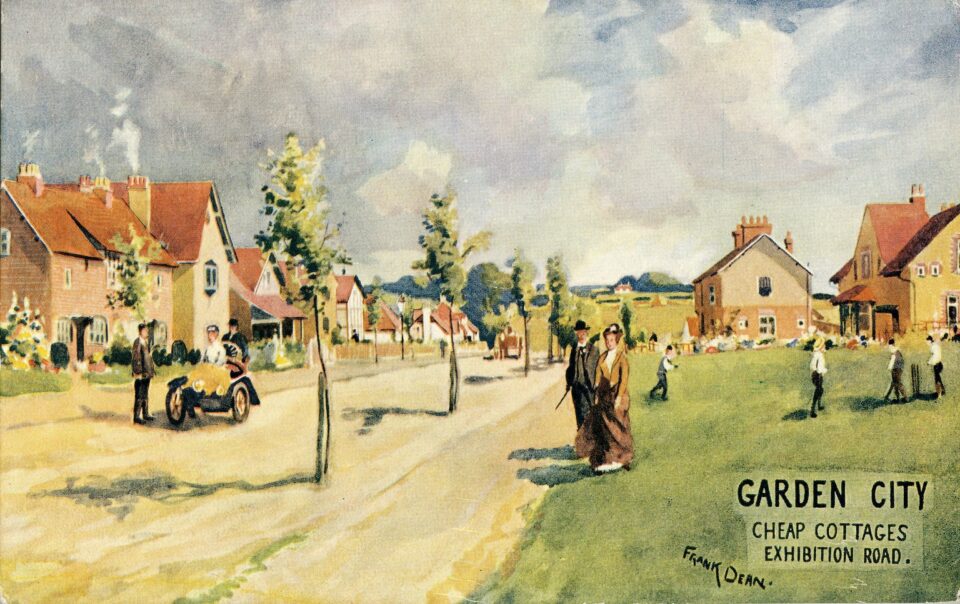A few months ago, I was asked by the journal of the Town and Country Planning Association to write a short article as part of the TCPA’s 125th anniversary. Back in 1898 the TCPA was instrumental in promoting the Garden Cities/New Towns concept and today remains a forum for more radical thinking in urban and rural planning concepts. The theme I developed was that, back in 1898, Britain faced remarkably similar urban issues to those of today – poor housing, millions unable to afford decent housing and little public money available to address the issue. The New Town concept that emerged in that era was not a tinkering with the existing housing system but sought to create a new urban development model that provided an environment that made well-designed and affordable housing viable.
Since I wrote this short piece, the Labour Party announced a policy for a New Towns building programme, and with the General Election taking place this week, this seemingly radical step may well develop into reality. But is this enough to address the fundamental housing and urban problems that we face? Will it facilitate good housing design, or facilitate the rolling out of unaffordable standardised low quality housing estates?
Back in 1898, the key Garden Cities proponent, Ebenezer Howard, was not an urban designer or a trained architect. He was an inventor (the shorthand typewriter used in Parliament was his invention) but his thinking on the urban problem was not at the level of housing or urban design. Architects knew how to design decent housing and, thanks to philanthropic businesses like Cadbury and Lever, these had been built in Garden Villages for their employees. But such designs and developments simply didn’t spread. Howard argued that systematic innovation was needed to address the housing crisis. For good and affordable housing to become the norm it should not depend on subsidies from philanthropic employers but a new urban development model needed to be designed that allowed good and affordable housing designs to became the norm.
In his seminal book: ‘To-morrow: a peaceful path to real reform’, Howard took what today we might view as a structural socio-technological analysis to provide an alternative approach to Britain’s dysfunctional urban infrastructure. The problem was not the design of affordable good quality housing, or good urban design, but the socio-economic system that made this viable. His key idea was proposing a transition path that could be initiated within existing structures, institutions and economic relationships.
Today we might call his approach ‘strategic niche management’, whereby the Garden Cities were learning trials to perfect the design of a new type of settlement so superior to traditional cities that they would initiate a regime change to a more equitable blended town/country settlement pattern. The physical design of the Garden City was only one part of this – the key factor was around Howard’s concept of a new type of business model for urban development, with rising land values brought about by urban development being captured by a local community trust and used to fund infrastructure and provide affordable housing for all. The ‘Real Reform’ was the socio-economic development model underpinning the Garden City concept.
In this there is a big lesson from the past, which Labour may not have grasped. Perhaps today we need to emulate Edwardian radicality rather than Starmerian incrementalism. When Labour takes office it is clear they will not have much room for large and expensive public funded projects. The New Towns development model was based on Howard’s concept (indeed the earlier New Towns like Stevenage made a profit for the Treasury!), which does suggest that further New Towns could be a financially viable way forward. Maybe this needs a bit of beefing up with some of Howard’s approach of identifying transition paths to a socio-technical regime change to identify how new technologies and business models can be applied to our urban systems and the institutional changes needed for transformative change. Trials, knowledge exchange and other learning opportunities can help to identify transition paths towards something that really will address the key challenges of the upcoming decades. Let’s find today’s ‘Peaceful Paths to Real Reform’.


Leave a Reply